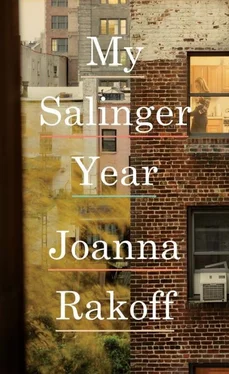“So what? You’re an early riser.”
“Dad,” I said quietly. “I just can’t. I need to have a life.” Through the archway, I saw my boss slowly making her way to our side of the office. “I have to go,” I said. “I’m sorry.”
“Everyone,” said my dad, “doesn’t get to have exactly what they want.”
“I know,” I said as quietly as I could. I loved my father fiercely, and a pang of longing for him, his physical presence, hit me in a sick wave. “You’re right.” But I was really thinking what all children think: You didn’t. But that doesn’t mean I won’t .
The letters piled up on my desk and the hours clicked by. At 1:30, my boss put her coat back on and went out, returning with a small brown bag. When, I wondered, would she tell me to go to lunch? And was I meant to do the same? To buy my lunch and bring it back, eat at my desk? The outside world had come to seem like a dream. There was just me and the Dictaphone, typing letter after letter, adjusting the dial on its side to slow down my boss’s voice so that it turned from alto to bass and I spent less time replaying bits. I was starving and my fingers ached, but not as much as my head. A steady stream of smoke drifted from my boss’s office out toward my desk. My eyes itched and burned as they did after a night at a bar.
Around 2:30, as I made my way through the final dictation tape, my boss came over to my desk. She’d walked by several times without acknowledging me, an odd sensation, as if I’d been turned into a piece of furniture.
“Well, you look like you’ve made some headway,” she said. “Let me take a look.” She grabbed the letters off my desk and retreated to her office.
A moment later, Hugh poked his head out of his office. “Have you had lunch?” he asked. I shook my head. He sighed. “Somebody should have told you. You can go to lunch whenever you like. Your boss usually goes a little earlier. I go later, but I often bring my lunch.” Somehow, this didn’t surprise me. He was the sort of person I could imagine eating a neat peanut butter and jelly sandwich, sliced into triangles and wrapped in wax paper. “Go now. You must be starving.”
“Are you sure?” I asked. “She”—I gestured toward my boss’s office—“just took the letters I was typing.”
“They can wait,” he said. “Those tapes have been sitting around here for a month. Go get a sandwich.”
Out on Madison, I found myself gazing through the windows of a chain sandwich shop, its wares too much for me, because everything was too much for me: I had nothing. A few dollars my father had slipped me, meant to last until my first paycheck, which I presumed would come at the end of the week. I didn’t even have a bank account in New York yet. I had so little money there seemed no point. My account in London was still open and there was some cash in it, but I wasn’t sure how much or how to access it, in this pre-electronic era. My wallet held two credit cards, but these I reserved for emergencies, and it didn’t occur to me that I might use them for anything but, that I might use them for something as unnecessary as lunch, no matter how hungry I was.
I would, I decided, simply buy a cup of coffee and an apple. A couple of dollars, at most. On the west side of Madison, I turned in to a deli and inspected a vast pile of overripe bananas. “What you like?” called the white-clad man behind the sandwich counter, smiling.
“Turkey on a hard roll,” I said, without really intending to, my heart beating with the recklessness of this gesture. “Provolone, lettuce, tomato, and a little mayo. Just a little. And mustard.”
At the register, I handed over a ten and was given two dollars and two quarters back, several dollars more than I’d expected to spend on so humble a sandwich. My pulse quickened with regret. Five dollars was lunch. Seven fifty? Seven fifty was dinner.
Back at my desk, I set down my sandwich and slipped off my coat. As I pulled out my chair to sit down, my boss appeared in the doorway to her office. “Oh, good, you’re back,” she said. “Come in and have a seat. We have some things to talk about.”
Glancing sadly at my sandwich, wrapped tightly in white butcher paper, I walked into her office and sat down in one of the straight-backed chairs that faced her desk.
“So,” she said, settling in her own chair, behind the vast expanse of her desk. “We need to talk about Jerry.”
I nodded, though I had no idea who Jerry was. “People are going to call and ask for his address, his phone number. They’re going to ask you to put them in touch with him. Or me.” She laughed at the ridiculousness of this. “Reporters will call. Students. Graduate students.” She rolled her eyes. “They’ll say they want to interview him or give him a prize or an honorary degree or who knows what. Producers will call about the film rights. They’ll try to get around you. They may be very persuasive, very manipulative. But you must never”—behind those huge, heavy glasses her eyes narrowed and she leaned across the desk, like a caricature of a gangster, her voice taking on a frightening edge—“ never, never, never give out his address or phone number. Don’t tell them anything. Don’t answer their questions. Just get off the phone as quickly as possible. Do you understand?”
I nodded.
“Never, ever, ever are you to give out his address or phone number.”
“I understand,” I told her, though I wasn’t sure I did, as I didn’t know who Jerry was. This was 1996 and the first Jerry that came to mind was Seinfeld, who presumably wasn’t a client of the Agency, though one never knew, I supposed.
“Okay,” she said, sitting back in her chair. “You understand. Now go. I’m going to take a look at your correspondence.” She gestured to the pile of letters I’d typed, neatly stacked on her desk. Seeing them, oddly, gave me a little rush of pride. They were so beautiful, that heavy yellow bond crowded with letters in inky black.
As I left her office, smoothing my skirt, I happened to glance at the bookcases directly to the right of her doorway, on the wall opposite the side of my desk that held the typewriter. I’d been staring at that bookcase all day, staring at it without seeing it, so focused was I on my typing. The case held books in corresponding hues: mustard, maroon, turquoise, imprinted with bold black type. I’d seen these books countless times—in my parents’ bookcase and the English department closet at my high school, at every bookstore and library I’d ever visited, and, of course, in the hands of friends. I’d never read them myself, due at first purely to happenstance, then to conscious choice. Books so ubiquitous on the contemporary bookshelf I barely noticed them: The Catcher in the Rye, Franny and Zooey, Nine Stories .
Salinger. The Agency represented J. D. Salinger.
I’d reached my desk before it hit me.
Oh , I thought, that Jerry .
Don lived in a large, dilapidated apartment at the intersection of two large, dilapidated thoroughfares—Grand and Union—in the Williamsburg section of Brooklyn. The apartment had three bedrooms: a small one, with a door leading directly to the common room, where Don slept; a large one, with two exposures, claimed by Leigh, Don’s roommate, who held the lease; and a central one, the door to which was tightly closed on my first visits to the place, like something out of du Maurier or a Greek myth. I assumed, at first, that a third roommate lived therein—space being the most valuable commodity in New York—but one evening in the late fall, I found the door open and saw that the room contained nothing but a vast pile of clothing—a mountain of clothing—all of it twisted and wrinkled and knotted and balled so that shapes could barely be discerned: a slip here, a skirt there, the sleeve of a sweater dangling onto the floor. This clothing was old—from the 1940s and 1950s, based on the prints and colors—and I asked Don if it had come with the house, found in a trunk or the attic, abandoned by a dead tenant.
Читать дальше












